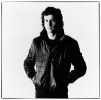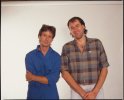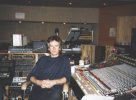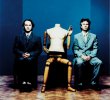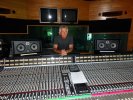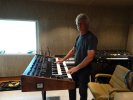“One for the vault” - Tony Banks in conversation with Alan Hewitt about his new Banks Vaults box set. Interview conducted on Tuesday 25th June 2019. Additional material by Kristine Fleckenstein. Photographs By Alan Hewitt, Jonathan Dann, Richard Nagy, Frank Rogers, Stuart Barnes and Memorabilia; TWR Archive/Esoteric Records.
TWR: Well, Tony we are here to talk about the soon to be released Banks Vaults box set. I would like to go through it with a few questions album by album with you, if that’s OK?
TB: Sure, that’s fine..
TWR: Right. We will start off at the beginning with A Curious Feeling, what songs on the album did you make most use of the Polymoog and the Yamaha CS80 on…? |
|
TB: Well, the Polymoog was used quite extensively on the opening track, From The Undertow all the swirls and stuff were created by that. I can’t remember the particular instrumentation on half these things. I didn’t use the CS80 that much I don’t think. And the main track which I used that on was the track on Duke: Duke’s Travels but the Polymoog was used quite extensively throughout the whole thing and all the other times it was pianos and guitars and it was along time ago and I am trying to remember exactly what I did! (laughs).
TWR: You based the album around the story Flowers For Algernon…
TB: Well I did originally but then I decided not to do that in the end because there was a show coming out in London at the time, a musical based on it starring Michael Crawford and it was suggested to me that probably I shouldn’t do that and so I changed the lyrics to make the story a little different, you know and so it is a little different but the overall sense of a man losing his mind, as it were, is all still in there. I think the story works OK actually, it isn’t as good as the original but it has got a certain amount going for it. |
|
TWR: I have read the book and listened to the album so many times, and they both work remarkably well but did you have a major re-think of the lyrics to the key songs when you were putting it together?
TB: It was mainly the song The Lie which was one I had to change completely and then there were little moments elsewhere that referred back to it for that sort of aspect of it. Most of the stuff on You and Somebody Else’s Dream all work with the original story so it was just those two or three moments that I had to change little bits of lyrics but The Lie was a totally different lyric, a totally different way of getting to the position I had to get my protagonist into, if you like.
TWR: How much material was recycled from the previous Genesis album…?
| TB: Not really, most of it was written at the time. Obviously when we did And Then There Were Three and as you know, the original of From The Undertow was written as an introduction for the song Undertow but it was quite different because I had modified it quite a lot as it was originally modified to go with the film, The Shout, and it emphasised the more spooky kinds of elements within the music and downplayed the more straightforward ones. I liked the way that turned out and so I decided I would use it as a starting point and everything after that was written at the time. I don’t think I had anything else from the past if you like. A few of the things that didn’t get used on A Curious Feeling ended up on Duke so it worked that way round this time. I didn’t have a different way of writing and I used whatever I had around using stuff on the next record. There was a certain amount of..it was great that those songs did so well but it was just as much a case that they could have been on a Tony Banks solo album ad no one would have ever heard them! (laughs). |
|
|
TWR: Moving on a couple of years now to The Fugitive, and you took the brave step of doing all the vocals on that one yourself. Why did you take that decision?
TB: Well, the original decision was taken because there had been a certain amount of confusion on A Curious Feeling as to who was the singer and obviously it was Kim Beacon and it wasn’t me. And a lot of people assumed it was me because it was under my name and everything and so to get around that particular problem I thought, why not give it a go and sing. I had a voice that I felt, in a studio I could make it OK, and so that is what I did really. I kind of took that approach and when I was working on the lyrics and melody I found that I had to adapt my approach to make it work with my voice. Whereas with both Peter and Phil I just used to say this is the melody, you sing it! (laughs) and I wasn’t prepared to do that with myself because it wouldn’t really work so I did it a different way and I think it worked pretty well.
TWR: Nowadays do you have any favourite tracks from the album and if so, which ones…?
|
|
TB: On The Fugitive? I don’t know, I always liked This Is Love because the sound of it is so good, the drumming particularly which was Tony Beard on that one and it sounded really good. I like the song By You very much as that was an interesting idea and the main rhythm of that comes from the Quadra and I liked the use of the Vocoder and I like most of the tracks but I am not a very good judge of my own music. I am not one of these people who says I don’t like that. I like it all! There are a few tracks which over the years I would perhaps not have done and that applies to Genesis as well but in the main I like what I did alone and I like what we did as a group as well..
TWR: Moving on to The Wicked Lady, did you use the Synclavier, which you have just mentioned, when you were putting both that album and The Fugitive together? |
|
TB: Yeah, particularly.. I must have done. The Wicked Lady was just a bit and the main part of that is the orchestral stuff which is all pure orchestra and has got none of me in it at all. The other side has got my versions of some of the themes which I just did at home with whatever I had to hand really which did include the Synclavier and the Polymoog and all the rest of them really. I think the album I used the Synclavier the most on was Soundtracks which comes up a bit later and I can’t remember using it that much on either of these.
TWR: You have mentioned that with an orchestral project you had an arranger involved with that one. How much was he involved with in terms of putting it all together?
| TB: He was the main man for it really and he wrote some of the stuff too and the Jerry Jackson thing comes from him and I was doing The Fugitive at the same time as I was doing The Wicked Lady and I ran out of time a little bit. He was great because he was enthusiastic about the stuff and he loved the main theme I had written as did Michael Winner and we used that very extensively in the film and that was an important thing and there were some other things where I didn’t really have the plan to be involved in the arrangement of stuff on some of the pieces and when we did the actual album we just took some of the incidental music and kind of used it and made sense of it as much as we could to make a record out of it. But I would have quite liked to have done a few of the pieces a bit more faithfully to the original ideas that I had. It would have been quite nice to have done that. Which was, of course, what led me to want to do the orchestral stuff I did later on. I love the way the orchestra sounded, I loved the way in that main theme particularly where Christopher Palmer, the arranger, did the things that he did to make it sound much better than it originally was and that led me to feel that that was something I wanted to do. |
|
TWR: When you reissued the album on CD a few years ago, did you have the temptation to expand it a little bit or did you think, best not to tamper..?
TB: Not really, I put it out there because I knew there were a few people who were… the fans (laughs) had requested it and I thought it would be nice to put it out. There wasn’t anything new I could really do with it but it was something that was not available and so I made it available.
TWR: You have just mentioned the Soundtracks album, an unusual couple of films that that music ended up being used in. Not quite what you would have expected. Were you expecting that when you were given the job of writing the music?
| TB: The way it was, was I took both of them because I wanted to get into film music and I just took the jobs as they turned up. The Lorca & The Outlaws thing looked a lot better before it was put together, I have to be honest, and because it was Science Fiction I knew I could use.. The piece that ended up as Redwing which was a demo which I had for possible use on the film 2010 and obviously the director of that film decided not to use me and so I had this stuff left over and so I played that to Roger Christian who was the director of the film, he liked it and I thought well, I will give it a go and they were both low budget films and I did the whole thing in my music room here and in those days it was quite difficult to do as there was no sort of computer stuff and I would have these great big U - matic which are like video machines clanking away in the background synching everything up which was quite interesting to do and in fact I ended up doing pretty much the same thing with Quicksilver although there was a slightly bigger budget on that but again they didn’t really want to spend money on that and I enjoyed it. It taught me a lot about putting things together but both films were, unfortunately… I mean Lorca & The Outlaws was just a terrible film but Quicksilver… well Kevin bacon has not made many films that were as unsuccessful as that one! (laughs) And I did this piece, I had this version of a piece I had written which I then recorded with Fish: Shortcut To Somewhere which was supposed to be used in a sequence in the film and then the director decided he wanted to use the Giorgio Moroder track instead, and so it made me a bit sour on the whole project - the 2010 experience followed by these two and I lost interest in doing films quite honestly and obviously if someone turned up with something fantastic, of course I would consider it but it never really happened again after that and in many ways having been able more recently to have been able to do the orchestral stuff I am much happier doing it that way rather than having to write according to what somebody else likes. I mean, when I did the Quicksilver soundtrack at one point I was taking a conference call with six people all of whom were telling me what was right and wrong, you know! I hate telephones anyhow, and the whole experience was not good. Having said that, I think some of the music is very good and I am particularly pleased with the piece I did with Toyah, Lion Of Symmetry which I thought was a really good song. |
|
TWR: Thank you for the lead into the next question there. You used three different vocalists on that album, perhaps an indication of what was to come in the next couple of albums, but how did you get those three; Jim Diamond, Fish and Toyah involved in that?
TB: Well, Fish had been suggested to me a few times, we shared the same publisher and we had a shared like of music I suppose so he was a slightly logical choice and the song we did together was not really a typical song from that genre I guess! |
|
| Toyah was again, suggested by the publisher and I thought, she’s not going to be interested in that and at the time she was pure Punk and I know later what with her marriage to Robert Fripp she changed a bit and she had the funny kind of hair and she was a bit frightening to me I suppose (laughs) and so it was with some trepidation we met and she was great and she was very enthusiastic about the piece and she write a lyric for it and I thought, that’s alright, that’s great and then she said I don’t like that lyric and so she got rid of that lyric and wrote another one which I thought was quite conscientious. What I found interesting working with her was that the music she had done on her own really, the use of her voice had been quite limited but she had a great voice with a lot of range. She sang high, she sang low, and I tried to get her to improvise at the end but she found that rather difficult actually and we got a little bit of shouting, not quite what I was after. The rest of it, the muddle bit where she sings very softly I think is lovely and the song was too long and too adventurous for the film but we ended up only using a bit of it in the film but it was a great experience for me to do something as I had had this piece around and I had wanted to do something with it and that was a good moment. |
|
TWR: We move on another couple of years now, to Bankstatement, and I have always wondered… Throwback, is there any kind of personal story behind that one…?
TB: None of my lyrics are actually totally personal, you know, what I try to do is put myself in a situation and then write from that point of view. My own life is too boring to write about (laughs) and we all kind of feel sometimes that we are past our prime and that things were better in the past and whatever and so I am sure we all feel like that. And so that was kind of taking that to a little extreme where you are feeling totally out of context and I wrote from that point of view. It isn’t difficult to put yourself in that point of view but it is not totally me, but it is a bit of me like most of the songs are a bit me, you know.
TWR: So there were no sort of socio-political events which inspired the other two tracks on that album: Big Man and The Border…?
TB: Well, Big Man was a sort of tongue in cheek thing really and I kind of liked because it was the only song I sang on I thought the idea of having a lunatic in control of the situation, which we could well have in a few weeks’ time if Boris Johnson becomes Prime Minister! (laughs). I mean it’s a bit like that; the guy who really shouldn’t be there and he suddenly finds out, I’ve got all this power! What does this button do? And all the rest of it and we have got Trump in America again, who is absolutely that and so you … I don’t even think Trump ever expected to become President and I think he was just playing a bit of a game and he ended up as President! I mean, the guy when he is there must think… And so it’s a bit like when you are there, you are playing the game a bit and I think Big man was an example, a rather extreme example of that. It is one of my favourite lyrics actually because it does conjure up an idea which is quite good and is quite relevant particularly at the moment when politics has gone completely nuts.
The other one you mentioned, The Border was a political thing and I have always found this idea of fighting battles about borders ridiculous in a way especially when you get these straight lines on a map. If you look at the border between, obviously the British sort of carved up the Middle East and put these straight lines down the middle of deserts and now they are fighting to preserve those borders and you van see, if you look at the border between Libya and Chad, that’s the wonderful one where it is really just one long straight line and people sort of fight for these things and there isn’t a border if you go there. I mean I have never been there but I have the feeling there is not much there! And so the line of blood in the lyric is this thing that you are fighting for and what does it mean? It’s all completely pointless and I feel that is what is in all these wars and I am not really a pacifist but I am a bit of a pacifist and all these wars; what were they fought about? Its over territory and ideas and the majority of people don’t really want to do it, it is just the people in power who have this obsession with having to fight their corner and everything and that is where all the problems come from.
TWR: Still… Gradually you had been building up almost a stable of vocalists but you really went overboard with Still. How did you decide upon the singers for this one?
TB: It all depends on who you end up, I mean with Bankstatement I tried the group experience and it didn’t do very well and so I thought this time I am just going to use whatever singer I want to use. I particularly wanted to use Nik Kershaw because I really liked his album, The Works which was the fourth album he had done and it didn’t do very well but I thought there was some wonderful stuff on it, particularly the track Cowboys & Indians and I liked his voice and I liked Vinnie Colaiuta who was the drummer on it and so I kind of hired them as a pair and then the idea of working with Fish again was mentioned as that was a good thing to do and Jayney Klimek as I liked her voice a lot on Bankstatement and she was available. The rest of them were just finding horses for courses really and I think it produced a strong record but it did lack an identity because it was different people. I do think we could have had a hit with I Wanna Change The Score. It is a strange thing, I think it deserved to get radio play and I think at the time, Genesis and particularly me, didn’t have that kind of thing that made people want to do it I suppose. It would have been nice to have done it a bit better but it was a good album.
|
|
TWR: By the time this album came out, technology had changed a heck of a lot, what synths/keyboards were you using on this one and how did they influence how you actually write the music?
TB: Well, I can’t remember everything…I had this thing I can’t remember what the bloody name of it is! (laughs). It was an instrument which definitely inspired the opening track, Red Day On Blue Street it was a big old thing but I can’t remember what it was called. There is no doubt that every instrument you got would kind of have an influence if you like and at that stage I was probably using things like DX7's and the Synclavier and everything and it was the usual mix of stuff plus a couple of new instruments but I don’t know what they were. |
|
|
TWR: Well, we shall move on to the last proper rock album, and definitely in my opinion, one of the best: Strictly Inc. How did you find Jack Hues for that one ?
| TB: Nick Davis who is obviously has helped me with quite a few of these records over the years and is a good friend, he suggested Jack, he had worked with him and I had heard tracks he had produced with him and I thought his voice sounded interesting, it sounded really good and I have said it before but I think he sounded a bit like I wanted to sound and I liked that and we got on very well. So, I decided just to use him as the singer on this one as a kind of different approach as he had a versatile enough voice and he was also a guitarist and he played some nice guitar although I did get Daryl (Stuermer) in for a couple of things because, especially for the big solo on An Island In The Darkness because it wasn’t part of what Jack felt comfortable doing and I wanted a real solo there and stuff. |
|
It was kind of like, I am glad you like the album and for me I think it is over all, one of the best, and I think particularly on the track An Island In The Darkness which is fifteen minutes long which is more like an old Genesis track and I felt that I put some good stuff into that. I put it out as Strictly Inc and it didn’t have my own name on it and it didn’t sell at all...
TWR: Which is astonishing given the strength of the material…
TB: The thing is, you know this, over the years it is a combination of… good material will help you, obviously, but you need the profile and everything and by this stage I didn’t have it and I think people were a bit fed up with Tony Banks solo albums in a way (laughs), certainly record companies were so it just sort of disappeared completely without trace and that is a shame which is one of the main reasons for doing all of this and the fact that Cherry Red want to put all of these records together and there were a couple of things from it which were on A Chord To Far and it is a chance for the whole thing to be out there and it has been deleted for over twenty years. |
|
TWR: You mentioned, obviously and it is one thing that fascinates me, is there a definitive story behind that lengthy epic track, An Island In The Darkness?
TB: Not really. It is just a song about ambition and you know when you are struggling along and nothing is happening and then suddenly you realise that things are starting to happen for you which is a comfort and then when you get to the big stuff in the middle how do you respond when things start going badly ? Can you still work it? That is what it was really all about. Which isn’t particularly how I think and I think it is how some people find it and to make it once is easy, to sustain it sometimes is quite tough, and that is the same in all walks of life not just music and so it was a bit of an illustration to that and then the final lyrical lines to it: “Do you have the will to carry on..?” and you leave it open. Some do and some don’t and it had a strong.. once I had to justify all the musical changes so you get those lyrical things, its like a life you know, you have exciting moments, and you have quiet interludes and all that and then you have the big guitar solo which is the focus of the entire piece.
TWR: And we shall bring things to a close with a couple of general questions. How does it feel to actually have all of these albums about to be back in circulation after all this time?
| TB: I don’t know how in circulation they will be. Let’s be honest about this, it is a limited market and I hoped it would happen with A Chord Too Far and it did happen a bit but not too much and if it puts things out there and with the modern way people can access music with downloads and Spotify and things you can collect tracks. Maybe it will do a bit more but I am not.. I don’t have great hopes and from my point of view I am just happy that it is out there again so it isn’t completely lost to the world in a way because I think…From my own point of view, I feel that the things I did on the solo records are just as good as the things I did on the Genesis records and they have a very high profile which I am very grateful for having! (laughs) I have been very lucky with what happened with Genesis and it hasn’t worked so well on the solo stuff and I wouldn’t change it, I am very happy to have it. |
|
TWR: Once again, you are talking to one of these anoraky completists, and a lot of us are wondering, all of the albums have been put together, there is the vexed issue of… I know there aren’t that many if them, but the various B sides, why weren’t they included in this project?
TB: How many B sides were there? The only B side I can think of from Strictly Inc and there may be a couple of others but to be honest, I was not that excited by that track and that was why when we did Bankstatement we put on the things like Diamonds Aren’t So Hard and obviously on The Fugitive we put on the two extra tracks because I was quite happy with them and I thought they were good tracks and they were left off initially because we didn’t have room. Whereas with that song, I didn’t think it was that good a song, actually and so I was quite happy to leave that off.
TWR: Between your good self and Esoteric, you went to the trouble of remixing the previous two albums (A Curious Feeling/The Fugitive) for 5.1, why not 5.1 for the whole project?
TB: Put it this way, Esoteric were not in a position financially and we were not going to do that. We did it with the first two albums and it worked really well and I think we could have done it with the next two but don’t forget, Strictly Inc and Still are both quite long records and I was very happy with the mixes we had. One of the reasons for doing the first two albums was to make the mixes better as well as 5.1 and those last two which I had done with Nick (Davis) anyhow and we were pretty much going to do the same thing again. We could have done them in 5.1 but to be honest, that whole sort of Surround Sound thing has gone slightly on the back burner these days and it could be done in the future but it would be quite a few weeks’ work to do it and we just felt it really wasn’t worth it and I could have done it, I don’t mind running at a loss but Esoteric certainly weren’t prepared to put the funds up! (laughs) And I understand that. The main thing was to get them out there so that is my feeling about it.
TWR: So, this comes out the middle of next month (July 2019) and then have you got any plans for anything yourself? Possibly a live performance/ or anything?
TB: Nothing is really planned. There is a possibility of someone doing one of my Classical pieces next year but that is in the future. No, at the moment I haven’t really written anything since I did …I don’t know if you know about those tracks I did with John Potter?
TWR: No, no, tell me more… |
|
TB: He has a little combo called Alternative History and these are classical and he sings in a quite sort of.. And I did an arrangement of some poems by Thomas Campion which I did and so a couple of them have ended up on a record and a couple of them ended up on You Tube. So if you look up Alternative History you will find them. And there are a couple. It is just a live performance of one of their gigs, and the last one I did was a Shakespeare sonnet that I did the music for and they are just, they are not The Knife, lets put it that way! (laughs). They won’t be everyone’s cup of tea but they were fun to do and I did them very quickly as it happened because the lyrics were written already …
And there you have it, from politics to Shakespeare and a bit of music thrown in as well. I hope you enjoyed this look back at Tony’s oeuvre. My grateful thanks to Matt Ingham at Esoteric and Jo Greenwood at TSPM for organising the interview. To Jon Kirkman for technical assistance and to Kristine Fleckenstein for her input.




